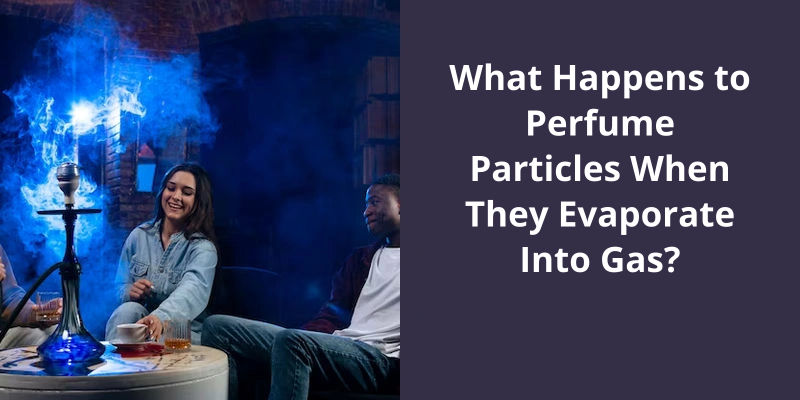When perfume particles evaporate into gas, they transition from a liquid state to a gas state. This process, known as evaporation, occurs when the particles gain enough energy from their surroundings, typically in the form of heat. The fragrance molecules are carried into the air where they spread out, and when they reach our noses, we detect the perfume’s scent. These evaporating particles do not change chemically, meaning they keep their original properties and just shift into a different physical state. The speed and extent of this evaporation heavily influence the strength of the perfume’s scent and how long its fragrance lasts.

What Happens to Perfume in the Air?
What happens to perfume in the air? Being a compressed chemical composition, once the perfume or cologne is sprayed into the air, it converts into a gas and it’s particles are mixed with other air particles. These particles very quickly circulate the room while the perfume spreads. The process of evaporation takes place as the volatile compounds in the perfume, such as alcohols and essential oils, transition from a liquid to a gas state. These volatile compounds have low boiling points, which enables them to easily vaporize into the air.
Higher temperatures increase the rate of evaporation, causing the perfume to spread more quickly and intensifying it’s scent. Similarly, lower humidity levels can also facilitate faster evaporation, while higher humidity may slow down the process.
This diffusion leads to a gradual dispersion and dilution of the perfumes scent over time. Additionally, air currents and circulation within the room can further distribute the perfume particles, carrying the fragrance to different areas and allowing it to reach our olfactory receptors even at a distance from where it was originally sprayed.
The Lifespan of Perfume in the Air and How Long It’s Scent Remains Detectable
- The factors that influence the lifespan of perfume in the air
- How long fragrance molecules can remain detectable in different environments
- The impact of temperature and humidity on the longevity of perfume scent
- The various notes and components of perfumes that affect their staying power
- Tips for prolonging the scent of perfume on your skin
- Common mistakes that can cause perfume to fade quickly
- Ways to store and take care of perfumes to maintain their potency
- Different fragrance concentrations and how they affect longevity
- Understanding the concept of perfume “sillage” and how it relates to lasting scent
- Exploring the science behind perfume volatilization and evaporation
Perfume particles, once released into the air, undergo a process called diffusion. This natural phenomenon causes the particles to mix with the air particles, granting them the freedom to move rapidly in every direction. As a result, the captivating fragrance of the perfume effortlessly travels and diffuses throughout the entire room.
How Do Perfume Particles Diffuse Around a Room?
When you spray perfume into a room, the tiny particles of fragrance mix with the particles of air present. This mixing process is known as diffusion. Diffusion occurs because perfume particles, like any other gas particles, are in constant motion and have a high level of kinetic energy. Due to this energy, the particles are free to move quickly in all directions.
Imagine dropping a drop of ink into a glass of water. Over time, the ink will spread and dissolve throughout the water. This is similar to how perfume particles diffuse through the air. The particles move randomly and are eventually evenly distributed throughout the room. This is why, even after spraying perfume in one corner of a room, the fragrance can be smelled all around.
This allows the fragrance to spread evenly in all directions.
The Science of Perfume Composition and How Different Ingredients Affect the Diffusion Process.
Perfume particles evaporate into gas through a process called diffusion. This occurs when the volatile molecules present in the perfume mix with the surrounding air. Each ingredient in a perfume has it’s own unique composition, and these different components can affect the rate at which the particles evaporate. Some ingredients are more volatile and evaporate quickly, while others have a longer-lasting scent. Additionally, the size and shape of the perfume particles can impact their diffusion. As the particles evaporate, they disperse throughout the surrounding space, allowing us to smell the fragrance.
Conclusion
In conclusion, when perfume evaporates into gas, the particles undergo a series of transformations. Initially, the liquid droplets are atomized into the air when we spray the perfume, leading to rapid evaporation. As a result, the gas particles are set in motion, oscillating randomly and diffusing into the surrounding air within the room. With time, the perfume becomes more diluted as the gas particles disperse and spread out. This intricate process allows us to experience the delightful fragrance of perfume, as it’s particles disperse and intertwine with the air around us.





